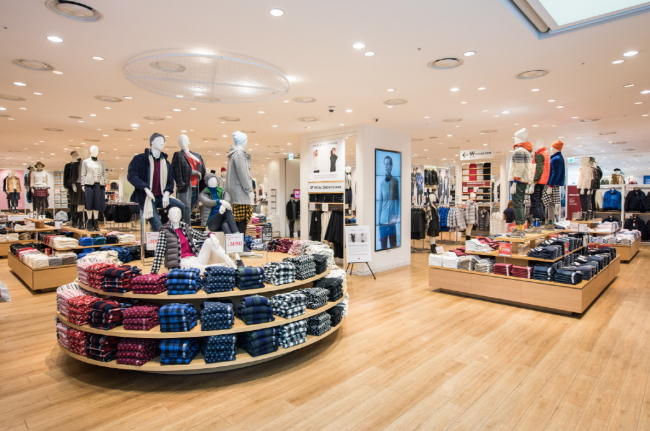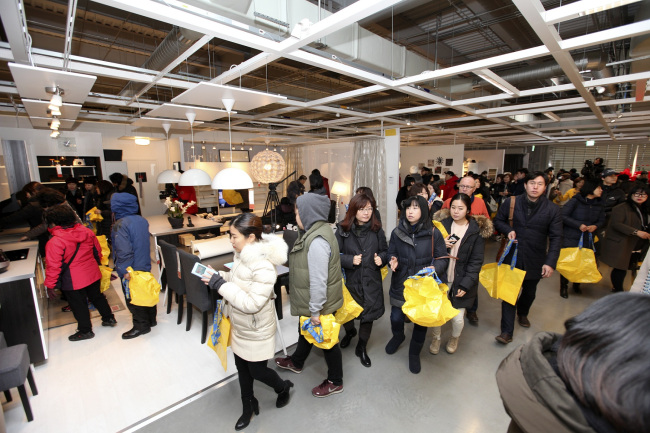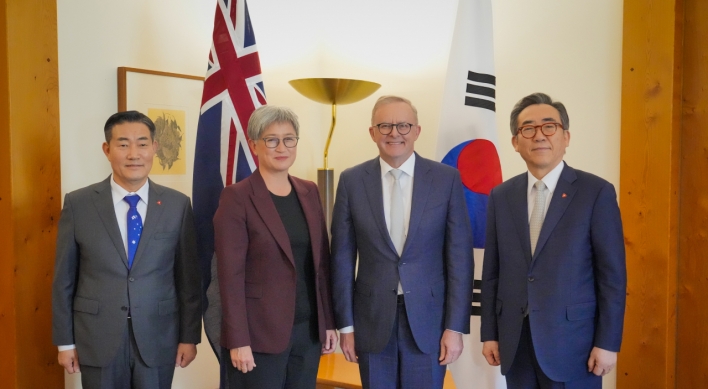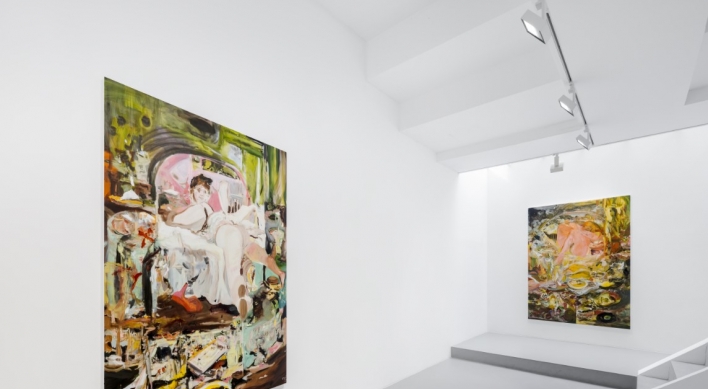[Weekender] Moving away from brand consciousness
Savvy shoppers are turning to affordable lines from fast-fashion products to groceries and furniture
By Korea HeraldPublished : Feb. 26, 2016 - 19:34
For Kim Min-sun, being a stylish person does not mean owning luxury designer bags.
The 35-year-old office worker in Seoul does not feel a need to purchase high-end purses anymore, not just because of the hefty price tags but also because she no longer sees much value in them.
“I think the time has come, when logo plays are not cool anymore,” she said.
“It is the value of the product that matters now. I think more about what I really want instead of how to impress others by showing off luxury items or being obsessed about brand names.”
Kim is one of a growing number of Koreans who are bucking the trend of high-end brand consciousness by turning instead to products that are more affordable yet functional and stylish.
Rather than pursing the luxurious opulence often portrayed in many magazines and advertisements, they are satisfied with other choices, which they often find out about through bloggers or online social communities.
“Consumers have become more sensitive to price. This trend that prioritizes reasonable spending will continue to accelerate,” said Kwon Ah-min, analyst at Dongbu Securities.
Industry watchers say that this kind of consumer spending is rising in Korea, causing ripples in Asia’s third-largest luxury market. High-end, imported products still remain a symbol of wealth and social status here but the luxury craze is not as hot as it was before.
Consumers are increasingly demanding products that are affordable yet chic and fast fashion retailers are expanding their presence here to cater to this growing preference.
The 35-year-old office worker in Seoul does not feel a need to purchase high-end purses anymore, not just because of the hefty price tags but also because she no longer sees much value in them.
“I think the time has come, when logo plays are not cool anymore,” she said.
“It is the value of the product that matters now. I think more about what I really want instead of how to impress others by showing off luxury items or being obsessed about brand names.”
Kim is one of a growing number of Koreans who are bucking the trend of high-end brand consciousness by turning instead to products that are more affordable yet functional and stylish.
Rather than pursing the luxurious opulence often portrayed in many magazines and advertisements, they are satisfied with other choices, which they often find out about through bloggers or online social communities.
“Consumers have become more sensitive to price. This trend that prioritizes reasonable spending will continue to accelerate,” said Kwon Ah-min, analyst at Dongbu Securities.
Industry watchers say that this kind of consumer spending is rising in Korea, causing ripples in Asia’s third-largest luxury market. High-end, imported products still remain a symbol of wealth and social status here but the luxury craze is not as hot as it was before.
Consumers are increasingly demanding products that are affordable yet chic and fast fashion retailers are expanding their presence here to cater to this growing preference.

Japanese fast-fashion retailer Uniqlo lies at the center of such change. It first opened in Korea in 2005.
The company sees a two-digit growth almost every year and its annual sales surpassed 1 trillion won ($809 million) last year. The retailer reaped 1.11 trillion won in sales in its 2015 fiscal year, a 25 percent increase from the previous year and a 45 percent increase in operating profit.
The success of Uniqlo lies in its quality, functional clothing that is offered at affordable prices, according to industry watchers.
The products are not the cheapest in the market, but their quality is found to be of a higher standard than others offered at similar prices. They cater to customers across various age groups ranging from toddlers to seniors.
Given the impact of the economic slowdown, Uniqlo’s emphasis on quality has been attracting even more customers, driving the growth of Korea’s fast-fashion brands market.
Fast-fashion is also known as SPA or Specialty Store Retailer of Private-label Apparel.
According to the Samsung Design Institute, the size of the market made up by fast-fashion brands here, surged from 500 billion won in 2005 to 3.17 trillion won in 2014. Other international SPA brands such as Zara and H&M have also contributed in the market formation and raised customers’ expectations as they bring in products inspired by Paris and Milan designs even faster than some high-fashion brands.
Uniqlo currently has near-dominant market status here but local SPA brands, established by the fashion arms of conglomerates here, are also gearing up marketing efforts. There is Eight Seconds launched by Samsung C&T, and SPAO, by E-Land, among others. These local brands say that their designs are different from those by foreign SPA brands.
Shinsegae is also reportedly preparing to launch a fast-fashion brand, under direct orders from its vice chairman Chung Yong-jin. According to news reports, the heir apparent of the retail giant has ordered his executives to create a fashion brand that produces clothing that even he would wear.
He might be talking about a new, affordable clothing line that anyone can wear, not necessarily just for him, the chaebol chief, said critic Shin Dong-heon in a TV show.

Ikea’s entry into the Korean market has also accelerated the growth of this kind of consumerism in the home and living sector.
Riding on the recent popularity of Scandinavian products in Korea, the Swedish ready-to-assemble furniture line earned 308 billion won of sales in its first year here. Besides its commercial success, Ikea has played a role in spreading the idea that a quality living experience is accessible to everyone, going against the notion that furnishing a house has to be luxurious and expensive.
Growing demand for quality yet affordable products is also spreading to other segments, pushing companies to focus on quality and lower prices.
Innisfree, an AmorePacific cosmetics brand which touts products made from natural ingredients, has recently released a line called “Super Food from Jeju,” which sells quality products at reasonable prices. The average price of the products in the line is between 5,000 won and 9,000 won lower than the brand’s other lines. The company built the line around the concept of five super foods -- broccoli, red beet, kale, blueberry and oats.
“To suit the recent trend driven by smart shoppers who focus more on fundamentals, we launched the new line taking various factors into account from concept, ingredients, price, size and design,” said Angela Roh, PR manager of Innisfree.
Some supermarket chains are also going in the same direction.
E-mart, one of the major retail chains here, has started to sell items not sold under a particular brand name. The line of products is called “No Brand” and E-mart has so far introduced about 250 items under this line, including butter cookies, diapers, tissues and potato chips. Since it was launched last year, more than 20 billion won worth of products have been sold under this line.
The packaging for the “No Brand” products are simple and functional, and prices are considerably cheaper than others. For instance, a pack of potato chips costs 50 percent less than other brands, when compared against items of the same product weight. E-mart had found ways to cut costs so as to achieve these low prices.
“Take butter cookies, for an example, we found a supplier in a Southeast Asian country that could deliver products at the lowest price and after signing a contract, we increased the order to further drop the price per unit,” said Kim Seong-kon, a PR manager for E-mart.
“This is new business category devised to focus more on price, for customers who go beyond an emphasis on brand names.”
By Cho Chung-un (christory@heraldcorp.com)
-
Articles by Korea Herald






![[Herald Interview] Mom’s Touch seeks to replicate success in Japan](http://res.heraldm.com/phpwas/restmb_idxmake.php?idx=644&simg=/content/image/2024/04/29/20240429050568_0.jpg&u=)



![[News Focus] Lee tells Yoon that he has governed without political dialogue](http://res.heraldm.com/phpwas/restmb_idxmake.php?idx=644&simg=/content/image/2024/04/29/20240429050696_0.jpg&u=20240429210658)








![[Today’s K-pop] Seventeen sets sales record with best-of album](http://res.heraldm.com/phpwas/restmb_idxmake.php?idx=642&simg=/content/image/2024/04/30/20240430050818_0.jpg&u=)